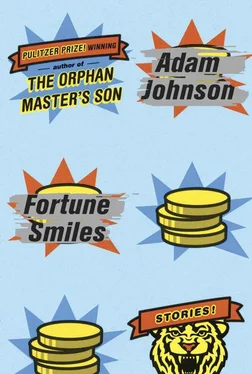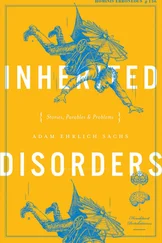Berta turns to me. “What is the proper response?” she asks. “How should they respond to torture?”
“Stop it with the metaphors,” I tell her. I unbutton my shirt cuffs. “You say you were in this very cell?”
The resolve in my voice changes the look on Berta’s face.
I glance upward, visualizing where the rooftop water tank is positioned four stories above. I follow the old pipes along the ceiling to the cells. Then I flip through my keys until I find the one that opens the valve locks.
“What are you doing?” Berta asks.
It takes some effort, but I manage to work the key into the old lock. Then, with both hands, I grab the valve handle and struggle to crack it open. When I do, a blast of rusty water sprays into the cell. I close it and begin unbuttoning my vest.
“Unpleasant, yes,” I say. “But I will show you this is not torture.”
“I don’t know what’s going on,” Berta says. “But there’s no need for this. This place is a memorial now. Its capacity to do harm has been retired.”
“I have a question for you,” I say to Berta as I free the last button on my shirt.
I know by the students’ faces that my scars have become visible.
“Please stop doing whatever it is you’re about to do,” Berta says.
“Just tell me,” I say. “Was there nothing of value here? Was there not one good thing to come from your time in Hohenschönhausen?”
Berta studies me as I remove my shoes and socks and place them against the wall.
“There is one thing,” she says. “If I tell you, will you stop?”
I pause to listen to her.
“The prison did something to me,” she says. “It made something in me come to life. My husband and I, even though we were young, we could not manage to have children. We tried for years. Within a month of my release, however, I was pregnant. We have three kids now.”
I imagine these children as I remove my hat, my false hair and my glasses.
“Your honesty is appreciated,” I tell Berta. “Now I’m going to be honest with you. Your whole existence has become a little story that you tell to strangers. And I will show you how this story isn’t true.”
“My story? You mean my life, the thing I was living before the Stasi arrived? Or the story the interrogators wanted me to confess to? Or the story I live now, where everyone tells me to forget the past and move on, yet every single thing leads back to this place?”
“You’re angry, I understand,” I say. “But these things you say about radiation and torture and the dead — they’re dangerous, they really hurt people. That’s why I must show you the truth.”
“And how will you do that?”
I remove my trousers and fold them neatly. Wearing only my undershorts, I step inside the cell.
“I’m going to close the door, and you’re going to bolt it,” I tell Berta. “Then you will open the valve.”
“Have you truly no memory of me?” she asks. “Have you forgotten your little nickname for me? Or what you did when you found out I was afraid of the dogs? Or the question I asked you countless times? My memory of you is so clear. I recall sitting in your office one afternoon. You made me wait while you spoke on the phone to your child. How horribly wrong it was, I thought, that you were able to have one.”
We gaze with strange wonder into each other’s eyes.
“Now, if you will,” I say.
When I pull the door shut, there is a new kind of dark.
“You will open the valve and leave it open,” I shout to Berta. “And I will call out when the depth of the water constitutes torture.”
I feel my heartbeat and the warmth of my breath in the tiny chamber.
The floor is wet, bracing with cold.
Through the door, I hear the muffled tones of a debate.
But I’m not concerned — I know what will happen. Running a prison teaches you a few things about human nature, and there’s no better feeling than being right about people.
“Please stop this,” she says through the door. “Please.”
She goes on imploring me like this.
It is funny, but through the metal and the rubber, her voice is different. It’s vulnerable. And that’s all it takes, the sound of fear and pleading through thick rubber, and it comes back to me. I recall. We once had a conversation through this very door.
“A ring,” I shout. “That’s what you wanted. A ring is what you kept asking me about.”
On the other side of the door is silence.
“Yes, a ring,” I call out. “I will tell you the truth of this ring. It was something I gave to the daughter of a coworker at a party. She had received perfect marks in school, and your ring happened to be in my pocket. There was a butterfly on it, am I right? That must have been the day of your arrival. It was perhaps gone from your very first day.”
There is silence on the other side of the door.
“Tell me,” I call, “what did it mean to you, this ring?”
One moment later, I hear the screech of the old valve as it starts to turn.
When the icy blast of rusted water strikes me, it does not surprise. The bits of iron in my chest sing with it. My skin hardens, my teeth bite. Yet it’s oddly not unexpected. I taste the zinc of metal rain gutters, breathe in the scent of fall leaves. Freezing bricks and cold mortar, that’s what the water feels like, yet it’s not necessarily bad, if such a thing is possible. It’s essential somehow, familiar, like the prison itself.
And I believe that Berta is right about one thing, that such endurance could cause you to travel far away in your mind. I think of Gitte’s journeys to a distant land where she need only cup a little ember to keep her warm. I suddenly feel it’s possible to go where she went. Perhaps we might finally share that space together. My body starts to go numb, the cold becoming something other than cold. When I can no longer feel at all, I will start my journey. I wait for that moment, tasting rain that fell long ago on a nation called East Germany.

Normally, I garden when night falls, when the urges come. But I was up most of the night writing an article titled “Is Your Pornography Watching You?” I just posted it — under a pseudonym, of course — to a fairly influential IT security website, and it’s going to get people talking. The article describes how a tracking beacon has made its way into child pornography files on the Web — every time a picture is copied, the beacon is copied, and every time the file is transferred, the beacon sends a signal. I’m the one who heard the signal.
I step from my small bungalow into the North Hollywood predawn dark. You can’t hear a peep from the Ventura Freeway, and the first 737 won’t lift from the Burbank airport for a little while yet. So I go to my roses, which line the chest-high fence around my yard.
The key to gardening at night is the headlamp. Don’t go for the xenon or halogen or LED models. The ideal beam should be soft and pale — by its glow, you should struggle to make out the true nature of something. The proper light can cast no shadow.
The neighborhood is a mix of aging Ukrainians and young Latinos, of spent porn actors and newly arrived hipsters. I turn on my headlamp and inspect the dusky crimson buds of my tall Othellos. Then I check on the Applejacks, the Chorales, the Blue Skies and the Bourbons — there’s a fascinating National Geographic article on the crossbreeding that produced the Bourbon. I spot a Marlowe on the cusp of perfection. Just before I touch it, someone approaches out of the darkness. In the faint glow of my lamp’s beam, I can see it’s Rhonza from down the street — she’s out walking at all kinds of crazy hours.
Читать дальше













